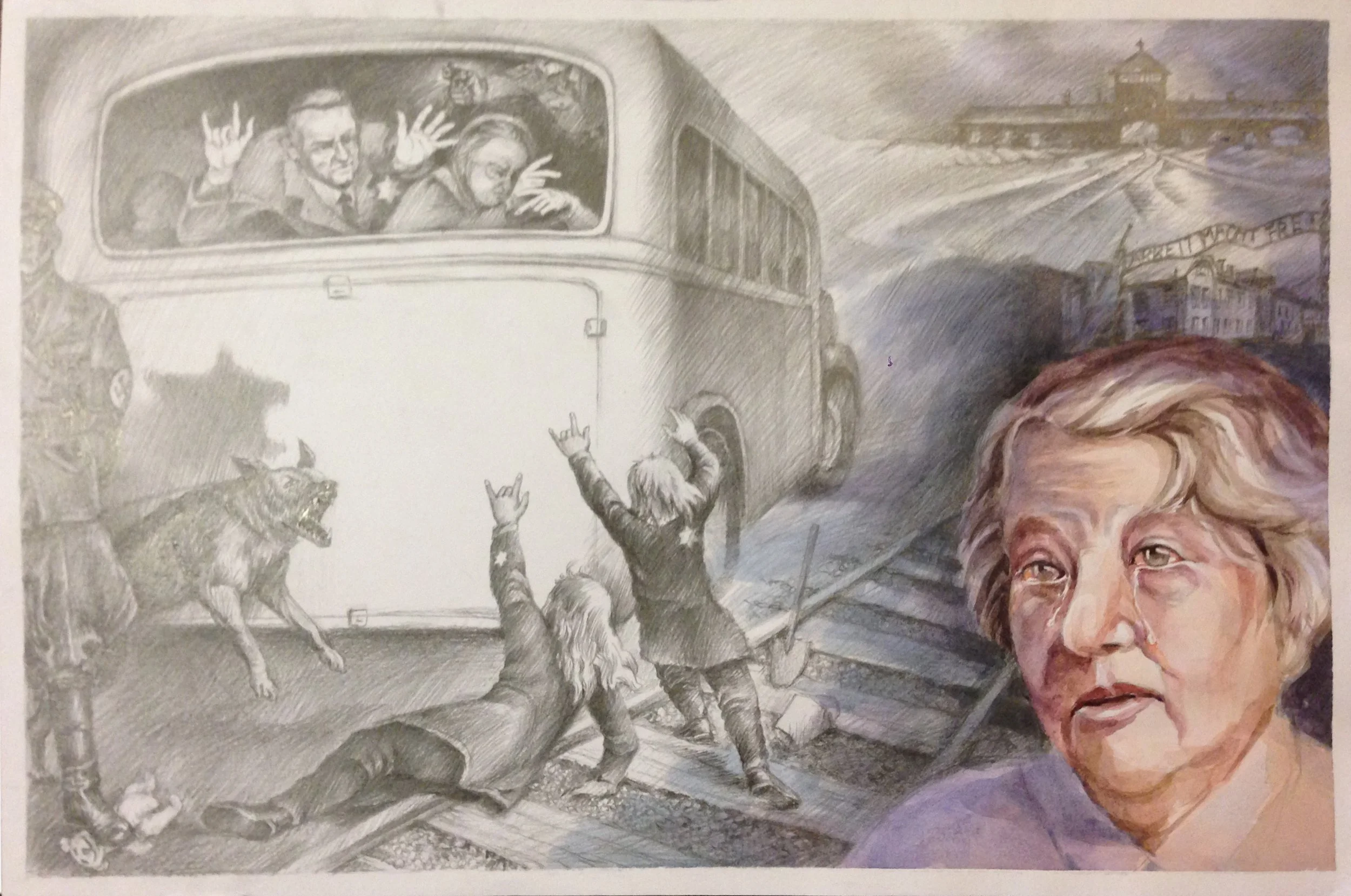‘A signature annual event for Chapman’: $3 million donation permanently funds Holocaust Art and Writing Contest
Holocaust survivor Jacob Eisenbach with students; Photo Courtesy of Jessica MyLymuk
For over two decades, the Holocaust Art and Writing Contest has been a staple of Chapman’s Rodgers Center for Holocaust Education, shedding light on the tragedy for new generations of students and artists. Now, thanks to the Samueli Foundation, it will remain a staple for many generations to come.
The newly-renamed Sala and Aron Samueli Holocaust Art and Writing Contest aims to provide education through engagement. With prompts that change each year, those who participate in the contest listen to the testimonies of individual survivors in an attempt to make the Holocaust more personal.
As the associate director of the Rodgers Center Jessica MyLymuk puts it, “For students listening to survivor testimony, the focus on large numbers and generalized events sharpens on the individual experience, making history personal. While students cannot relate to the exact experience of Holocaust survivors, they discover shared moments of humanity on which they can reflect and with which they can connect.”
Housed within Chapman’s Wilkinson College of Arts, Humanities and Social Sciences, the Rodgers Center for Holocaust Education is an educational program that uses a series of events to educate students on the depth and impact of the Holocaust. Chapman University remains one of only a select few private universities in the U.S. to offer dedicated educational programs on the Holocaust.
Samueli Foundation founders Henry and Susan Samuel previously provided the financial backing for Chapman’s Sala and Aron Samueli Holocaust Memorial Library in honor of Henry’s parents who survived the Holocaust and have now made a new donation for the contest to the tune of $3 million, to fund it permanently.
“The Samueli Foundation gift ensures a lengthy future for the contest,” wrote MyLymuk. “In the short-term, it allows us to provide participating educators additional support. We currently provide several in-person workshops and virtual webinars to prepare educators to bring the contest’s theme and prompt to their students.”
Never Again by Hailey Shi - about Engelina Billauer; Photo Courtesy of Jessica MyLymuk
The newly-renamed Sala and Aron Samueli Holocaust Art and Writing Contest remains the Rodgers Center’s key tool for educating students on the Holocaust. It’s especially important in a nation where education on one of the deadliest genocides in history is rare.
“Since its inception, the contest has reached over 150,000 students in schools from 45 states and 25 countries,” said Rodgers Center director, Marilyn Harran. “The Samueli Foundation has sponsored the contest for 20 years and their generous support has allowed us to grow the contest and engage students and educators on a national and international level.”
In an age where anti-semitism is on the rise around the U.S., those at the Rodgers Center have found it critical to continue to provide a strong education on the Holocaust and the lasting effects it has had on those who survived it. Harran believes that the contest is a way of doing just that.
“Part of the mission of the Rodgers Center is to develop in students a strong awareness of the cost of silence and inaction in response to antisemitism, bigotry, and racism,” said Harran. “The contest allows us to work toward that goal at the middle and high school levels.”
While the contest may be the most prominent program the Rodgers Center offers, it is certainly not the only one. Dean of Wilkinson College Jennifer Keene said as much in our interview:
“The Rodgers Center offers critical campus and community programming that includes talks with survivors and witnesses, scholarly lectures, an annual service of remembrance for Kristallnacht and evening of Holocaust Remembrance,” said Keene. “The Center houses a museum, library and archives on the fourth floor of Leatherby Libraries. The Rodgers Center director and one of the co-directors are also faculty in the history department where the minor in Holocaust History offers Chapman students a unique opportunity to delve more deeply into the topic and help with the annual contest.”
The impact of tragedy often softens in the minds of many as time runs its course. Even the most devastating massacres, the most brutal wars and the bloodiest genocides may lose their edge once translated to paper in a textbook. But for the Rodgers Center, nothing is more important than reminding people that for those who underwent the genocide of Jewish people and others who were considered undesirable by Hitler’s regime, it was far worse than a textbook could ever convey.
“The Center is more important than ever given the rise of attempts to deny or downplay the Holocaust. It embraces as its mission our collective responsibility to never forget,” said Keene.


